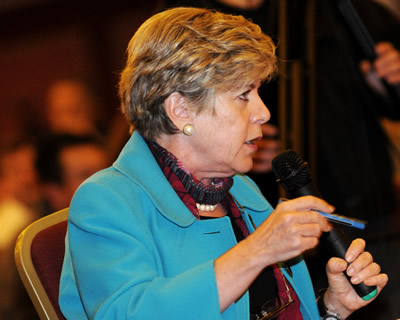Executive Secretary of ECLAC Took Part in Policy Debate in Montevideo
Topic(s)
Alicia Bárcena spoke at a forum that was also attended by the President of Uruguay, José Mujica, former Brazilian President, Luiz Inácio Lula da Silva, and Secretary-General of CSA, Víctor Báez.

(5 April 2013) The Executive Secretary of the Economic Commission for Latin America and the Caribbean (ECLAC), Alicia Bárcena, put forward a series of policies aimed at achieving development with equality in the region at the Public debate on: Transformations at risk? Prospects and tensions of progressivity in Latin America, which was held at the MERCOSUR building in the Uruguayan capital on Thursday 4 April.
At the forum - which was also attended by Uruguayan President, José Mujica, former Brazilian President, Luiz Inácio Lula da Silva, and Secretary-General of the Trade Union Confederation of the Americas (CSA), Víctor Báez - Ms. Bárcena stated "The structural change for equality proposed by ECLAC requires us to go to the heart of the economy, to transform production and consumption patterns and close the gaps between small and large enterprises, with rights-based employment as our master key".
At the debate organized by the Friedrich Ebert Stiftung Foundation in cooperation with CSA, the ECLAC Executive Secretary highlighted some of the successful policies implemented by Brazil to reduce poverty and inequality in recent years, such as the conditional transfer programmes and the rise in minimum wages. She also called on the region's countries to reinvest the extraordinary income from natural resources.
The forum discussed many topics, including the need to deepen democracy, strengthen unions, promote fiscal reforms and reinforce regional integration processes. Participants also spoke about the current international economic crisis from the viewpoint of global governance.
The President of Uruguay, José Mujica, underlined the importance of strengthening integration among member countries of the Southern Common Market (MERCOSUR) and predicted that the region will be "the most envied continent in the world" as "an emporium of strategic resources for human life on earth".
Mr. Lula da Silva said "I have never seen Latin America advance as much as in the last 10 years". He went on to show appreciation for the work of ECLAC by citing data produced by this regional commission of the United Nations. The former President said he was optimistic about the region's future, provided that countries manage to implement policies that combine economic growth with social inclusion.
Víctor Báez, from CSA, based his message around the relevance of progress in matters such as freedom of association, collective bargaining and the right to strike in Latin American countries as a basis for deepening democracy.
Alicia Bárcena declared that this decade had seen progressive leaders save 57 million people from poverty, while equality based on an entitlement to rights had become the goal.
Today in Montevideo Ms. Bárcena is closing the Fourth Ministerial Conference on the Information Society in Latin America and the Caribbean, which is being held from 3 to 5 April in Montevideo, and is organized by ECLAC through the ECLAC @LIS2 project - jointly financed by the European Commission - and the Government of Uruguay, through the Agency for Electronic Government and the Information Society (AGESIC).
Any queries should be sent to the ECLAC Public Information and Web Services Section.
E-mail: prensa@cepal.org; Telephone: (56 2) 2210 2040.
Country(ies)
Contact
Public Information Unit
- prensa@cepal.org
- (56 2) 2210 2040